| Srl | Item |
| 1 |
ID:
074942
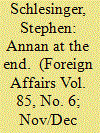

|
|
|
|
|
| Publication |
2006.
|
| Summary/Abstract |
In The Best Intentions, James Traub provides an inside view of the UN secretary-general during one of the organization's most tumultuous eras. Annan emerges as a flawed but principled statesman, with a stature his successors are unlikely to achieve.
|
|
|
|
|
|
|
|
|
|
|
|
|
|
|
|
| 2 |
ID:
094458
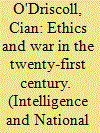

|
|
|
|
|
| Publication |
2010.
|
| Summary/Abstract |
The discipline of International Relations has a patchy record when it comes to accounting for change in world politics. It has tended to focus on continuity instead. A typical statement in this regard is Martin Wight's depiction of international affairs as a 'realm of recurrence and repetition', while Hans Morgenthau has drawn attention to its 'repetitive character'.
|
|
|
|
|
|
|
|
|
|
|
|
|
|
|
|
| 3 |
ID:
096169
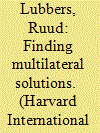

|
|
|
| 4 |
ID:
127090


|
|
|
| 5 |
ID:
123042
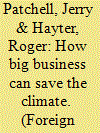

|
|
|
|
|
| Publication |
2013.
|
| Summary/Abstract |
In September 1987, representatives of 24 countries met in Montreal and accomplished a rare feat in international politics: a successful environmental accord. The Montreal Protocol on Substances that Deplete the Ozone Layer, which UN Secretary-General Kofi Annan later called "perhaps the single most successful international agreement to date," set the ambitious goal of phasing out chlorofluorocarbons (CFCs) and other dangerous chemicals. It worked: by 1996, developed countries had stopped their production and consumption of CFCs, and by 2006, the 191 countries that had ratified the protocol had eliminated 95 percent of global ozone-depleting emissions.
|
|
|
|
|
|
|
|
|
|
|
|
|
|
|
|
| 6 |
ID:
100443
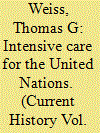

|
|
|
| 7 |
ID:
129968
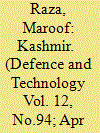

|
|
|
| 8 |
ID:
123232
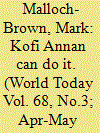

|
|
|
| 9 |
ID:
165913
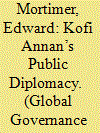

|
|
|
| 10 |
ID:
097678
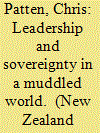

|
|
|
| 11 |
ID:
165912
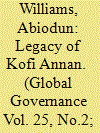

|
|
|
| 12 |
ID:
117795
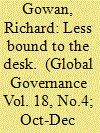

|
|
|
|
|
| Publication |
2012.
|
| Summary/Abstract |
WHAT SORT OF DIPLOMATIC STRATEGIST IS BAN KI-MOON? SINCE BAN TOOK
office as Secretary-General of the United Nationsin 2007, there has been a
great deal of discussion about his personal diplomatic style. Until the Arab
Spring, he was typically characterized as an archetypal (though not always
effective) quiet diplomat. In January 2011, Human Rights Watch accused
Ban of having an "undue faith in his professed ability to convince by private persuasion" when dealing with repressive governments in cases such
as Myanmar, Sudan, and Sri Lanka.
1
As I argued in a previous article for
Global Governance, Ban's belief in diplomacy meant that he took too little
interest in peacekeeping during his first term leading the UN.
2
Since the
beginning of the Arab Spring, however, Ban appears to have lost some of
hisfaith in diplomatic niceties. He spoke out early in favor of the protestors
in Egypt, became a consistent supporter of military action in Libya, and
publicly condemned the Syrian regime's violence against civilians as early
as May 2011.
3
Asthe Syrian crisis deteriorated in 2012, Ban appointed first
his predecessor, Kofi Annan, and later the stalwart UN mediator Lakhdar
Brahimi as envoys to Damascus but repeatedly escalated his own criticism
of President Bashar Al-Assad.
|
|
|
|
|
|
|
|
|
|
|
|
|
|
|
|
| 13 |
ID:
125092
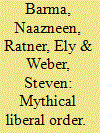

|
|
|
|
|
| Publication |
2013.
|
| Summary/Abstract |
AFTER A year and a half of violence and tens of thousands of deaths in Syria, the UN Security Council convened in July 2012 to consider exerting additional international pressure on President Bashar al-Assad. And for the third time in nine months, Russia and China vetoed any moves toward multilateral intervention. Less than two weeks later, Kofi Annan resigned as the joint UN-Arab League special envoy for Syria, lamenting, "I can't want peace more than the protagonists, more than the Security Council or the international community for that matter."
|
|
|
|
|
|
|
|
|
|
|
|
|
|
|
|
| 14 |
ID:
099863
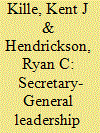

|
|
|
|
|
| Publication |
2010.
|
| Summary/Abstract |
The UN and NATO have been jointly engaged in a range of conflicts in the post-Cold War era. Studies of these organizations, however, have largely overlooked the institutional interplay between their Secretaries-General. After brief reviews of the relationship between the UN and NATO and the leadership role that a Secretary-General can provide, this article examines the political relationship between Kofi Annan and Javier Solana across three stages of NATO's 1999 Operation Allied Force in Kosovo. The findings show the important roles played and coordinated effort supplied by the Secretaries-General. This provides new perspectives on UN-NATO institutional coordination and has important implications for considering the relative security roles to be played by the UN and NATO in the future.
|
|
|
|
|
|
|
|
|
|
|
|
|
|
|
|
| 15 |
ID:
099092
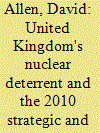

|
|
|
| 16 |
ID:
108371
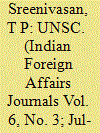

|
|
|
| 17 |
ID:
101970


|
|
|
|
|
| Publication |
2010.
|
| Summary/Abstract |
I am very grateful for the invitation extended to me to address this distinguished audience on the topic of the Alliance of Civilizations.
Before sharing a few issues with you on this United Nations initiative that I have been leading for the last three years as its High Representative, let me stress that I see this visit to Moscow as a turning point in the overall engagement of the Russian Federation with the Alliance
|
|
|
|
|
|
|
|
|
|
|
|
|
|
|
|